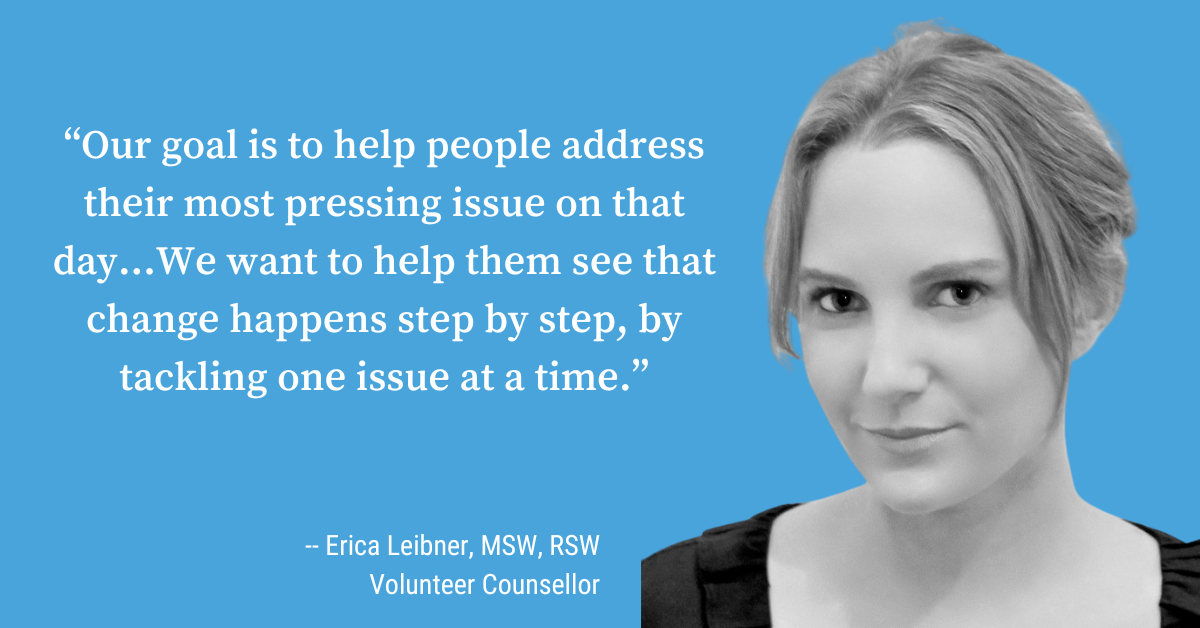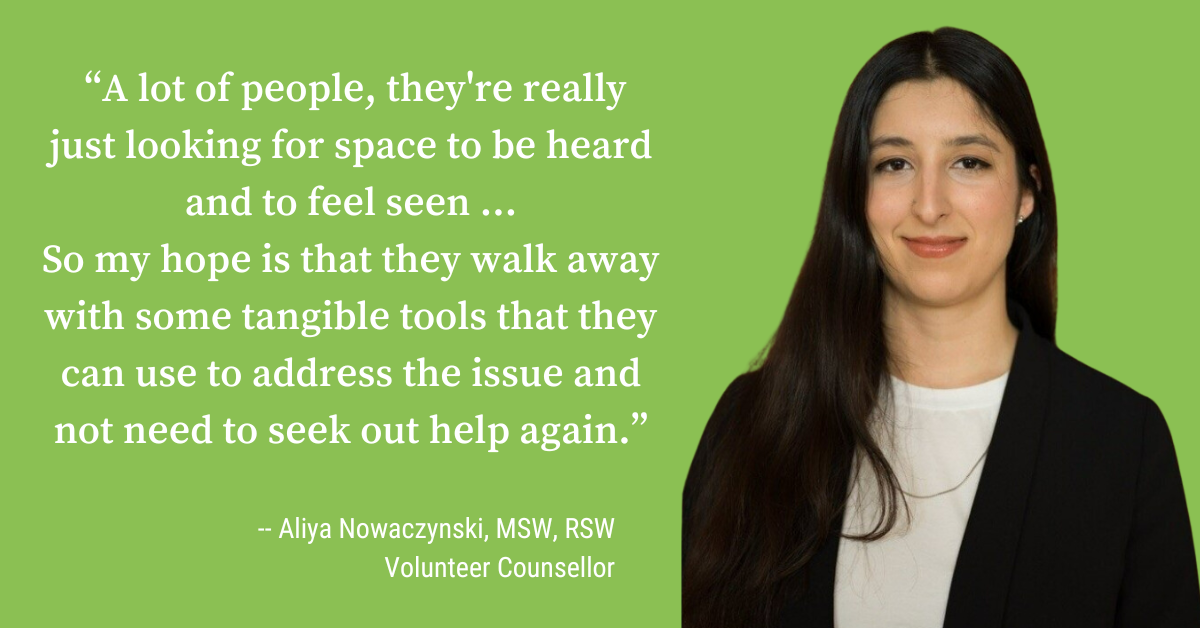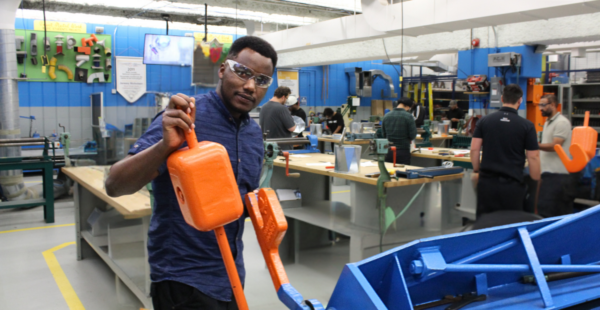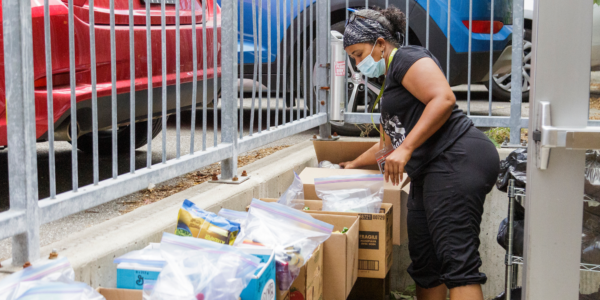The people Aliya Nowaczynski meets at WoodGreen’s Walk-In Counselling service often have never met someone like her before. That’s because, for many, it is the first time they’ve sought help with their mental health.
“I just want to make sure they have a positive first experience,” says Aliya who, for the last 18 months, has volunteered as a counsellor at WoodGreen’s east end clinic.
➡️ NO appointment. NO charge. NO judgment. NO referral.
Every year the service – which is completely free of charge – helps as many as 1,200 people. Beginning in 2011, clients have been able to see a counsellor on a drop-in basis. Initially, it was one evening a week, but five years later WoodGreen added a second evening. Counselling services shifted to fully online during the pandemic and have now moved to a fully hybrid model. Tuesdays are in-person sessions, Wednesdays are virtual.
Need for counselling is growing
Whether in-person or online, the need for free, accessible mental health counselling in Toronto is greater than ever.
“As the cost of living is going up, therapy is something that is very expensive,” says Aliya, who has a master’s degree in social work and a background working with WoodGreen’s caregiver support program. “If you don't have benefits, therapy can feel very inaccessible.”
Private therapy in Toronto ranges from $100 to $300 per hour. Wait times for services covered by the Ontario Health Insurance Plan (OHIP) can run from several weeks to several months.
One of very few drop-in options
WoodGreen is one of only a few local organizations offering free counselling on a drop-in basis. Without it, volunteer counsellor Erica Leibner, says her clients would have very few options.
“People often fall through the cracks,” she says,”and often, it takes a trip to the ER or even a suicide attempt for someone to get the psychological assistance they need.”

Her colleague, Aliya, agrees that WoodGreen’s clinic is there for people in a way the provincial health care system currently isn't. “What’s great about the walk-in [counselling] is you have clients who are on wait lists for longer term counselling and support that can get some help with us while they wait,” she says.
Strength lies in immediacy of session
WoodGreen’s service, however, is not designed to replace long-term therapy. Its ability to serve clients promptly and without an appointment is rooted in its philosophy; providing care precisely when people want and need it. Its design helps make this possible. Time spent with each client is ideally one hour (though it can run longer). Therapists take a break partway through the session to consult with the clinic supervisor. They then discuss resources, strategies and get input from other counsellors who have experienced similar cases. The visit is designed to be a stand-alone session and not part of continuous care.
“Our goal is to help people address their most pressing issue on that day,” says Erica, who has volunteered with WoodGreen’s Walk-In Counselling program for more than three years. “People usually come to us due to a number of factors, often with a problem that feels impossible to tackle. We want to help them see that change happens step by step, by tackling one issue at a time.”
It is the immediacy of the model; addressing the most urgent issue precisely when it is most pressing, that truly gives WoodGreen’s mental health counselling its strength, says Erica.
“Acute emotional pain can feel unbearable,” she says. “At the Walk-In-Clinic we have the opportunity to help people manage their feelings in a different way; to notice them and make space for them without judgment.”

Helping people far beyond Toronto
Clients may return for another standalone session but likely not with the same counsellor and if someone new is there for the first time, that person gets priority. In recent years, roughly one in five clients has had more than one appointment.
As for who is using the service, Cindy Nash, Supervisor of Walk-in Counselling, says counsellors have helped people of all ages, races, ethnicities, sexual orientations, religions, genders, languages and abilities. Traditionally, those seeking in-person appointments live nearby, but with the introduction of virtual services new trends have emerged. Counsellors have begun helping people across the GTA, around Ontario and even outside of the province and country. The only requirement is that the person turns up either in-person or virtually.
Volunteers praise supportive peers
There are currently 50 practitioners, all registered mental health professionals, donating their time and expertise to help support mental health needs in their community. Both Erica and Aliya say their experience as volunteer therapists has been overwhelmingly positive, praising the clinic’s supportive, collegial environment.
“WoodGreen Walk-In-Clinic provides an invaluable opportunity to those in my position,” says Erica. “Especially for new grads, people on maternity or sick leave. They can hone their counselling skills for a commitment of as little as one evening per month.”
➡️Want to become a volunteer therapist?
Each night, whether virtual or in-person, there are several therapists available to see up to two clients each.
Tackling acute and ongoing issues
Both Erica and Aliya say clients arrive facing all kinds of mental stress, ranging from anxiety and depression to trauma from abusive relationships. However, they say one issue is becoming increasingly prevalent.
“One thing that actually has happened multiple times is clients just come in because they're looking for housing and they are experiencing homelessness and they have kind of an acute need for housing,” says Aliya. In those situations, counsellors connect clients with WoodGreen’s Housing and Homelessness Support Services.
WoodGreen designed the walk-in counselling to tackle an acute issue. However, Aliya says that does not mean that problems clients are facing are necessarily new.
“The last two times I volunteered, the clients were coming in with issues that they've been experiencing for sometimes five years, sometimes their entire adult life. And they’re now just dealing with it in their 60s or 70s,” she says.
Counselling is free and confidential
Clients do not need an appointment. They do not have to produce a health card or identification of any kind and can remain anonymous. Counselling is open to all ages, including teens and children. Those under the age of 12 require parental consent, but teens do not. Sessions are confidential with the exception of those cases in which someone is at risk of harming themselves or someone else, or a minor is at risk of abuse or neglect or is being neglected.
➡️What to expect of a walk-in counselling session.
With sessions limited to one hour, counsellors measure success in very immediate ways.
“A lot of people, they're really just looking for space to be heard and to feel seen and validated in what they're going through,” says volunteer counsellor Aliya. “So my hope is that they walk away with some tangible tools that they can use to address the issue and not need to seek out help again.”
Walk-In Counselling is available:
Tuesdays (in-person) 4 p.m. to 6:30 p.m. @ 815 Danforth Ave
Wednesdays (virtual) 4 p.m. to 6:30 p.m. @ (416) 645-6000 ext.1990





